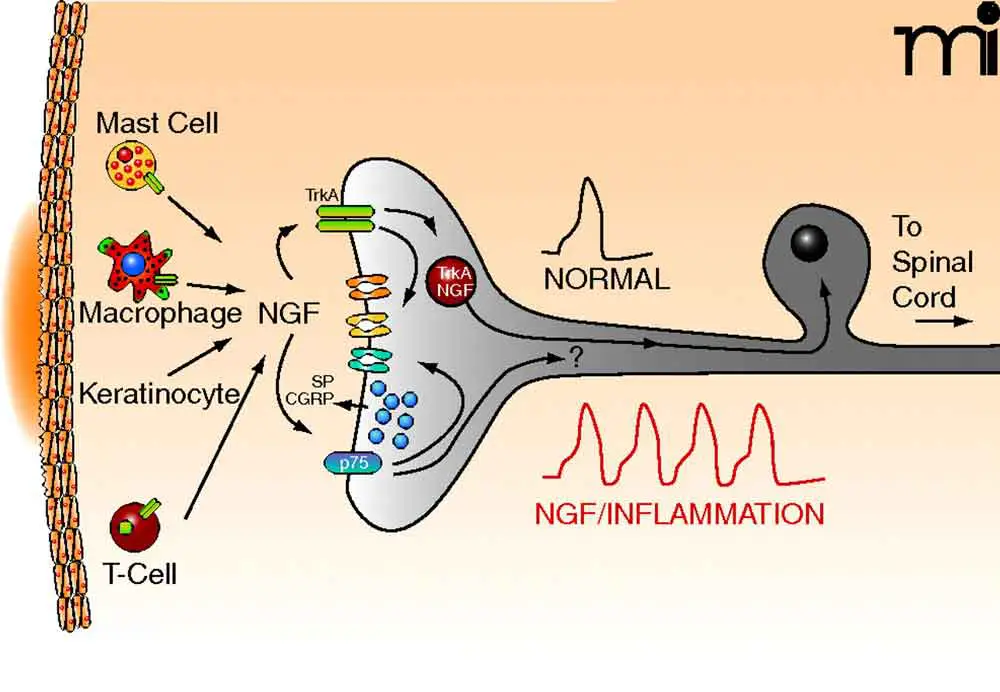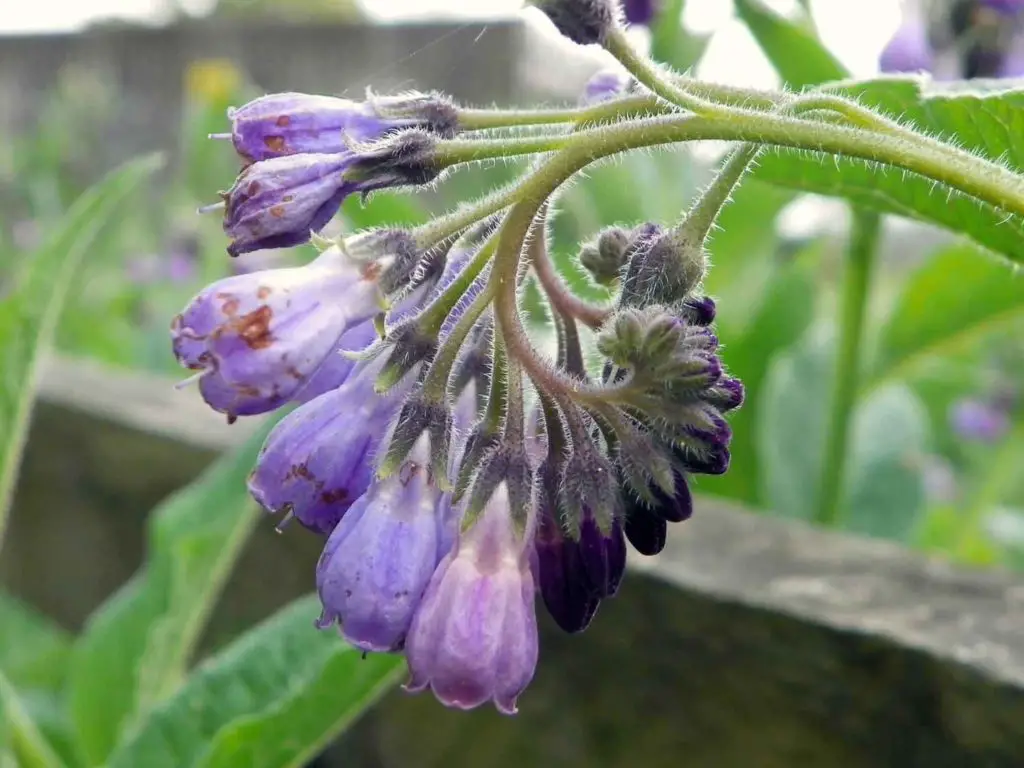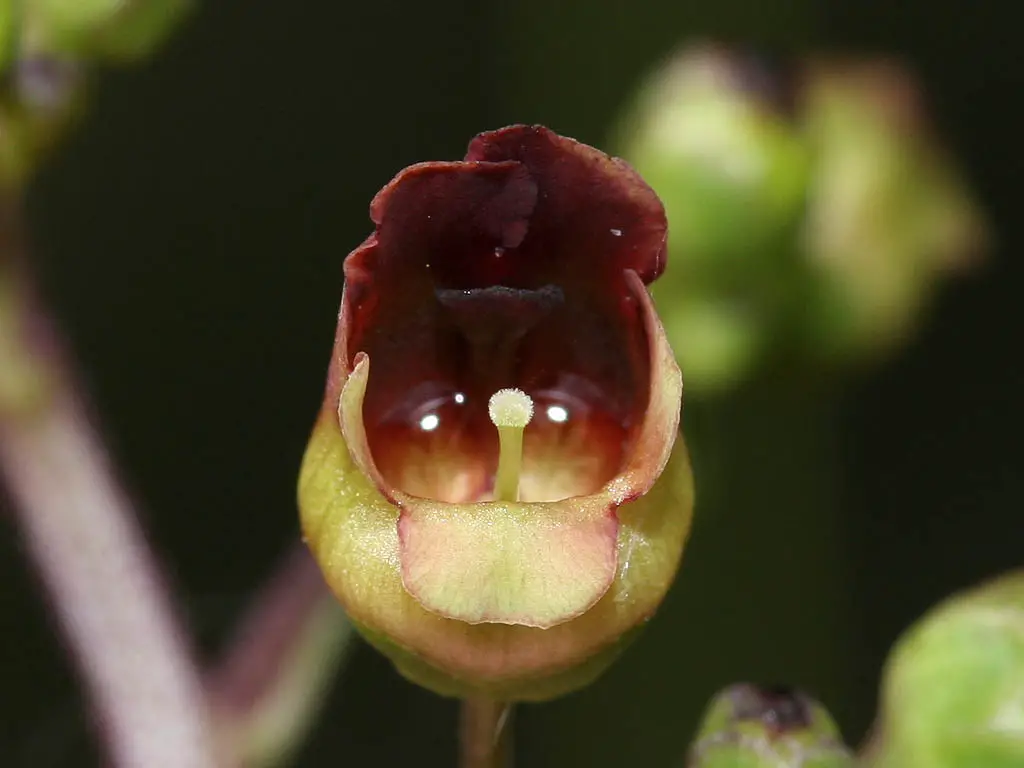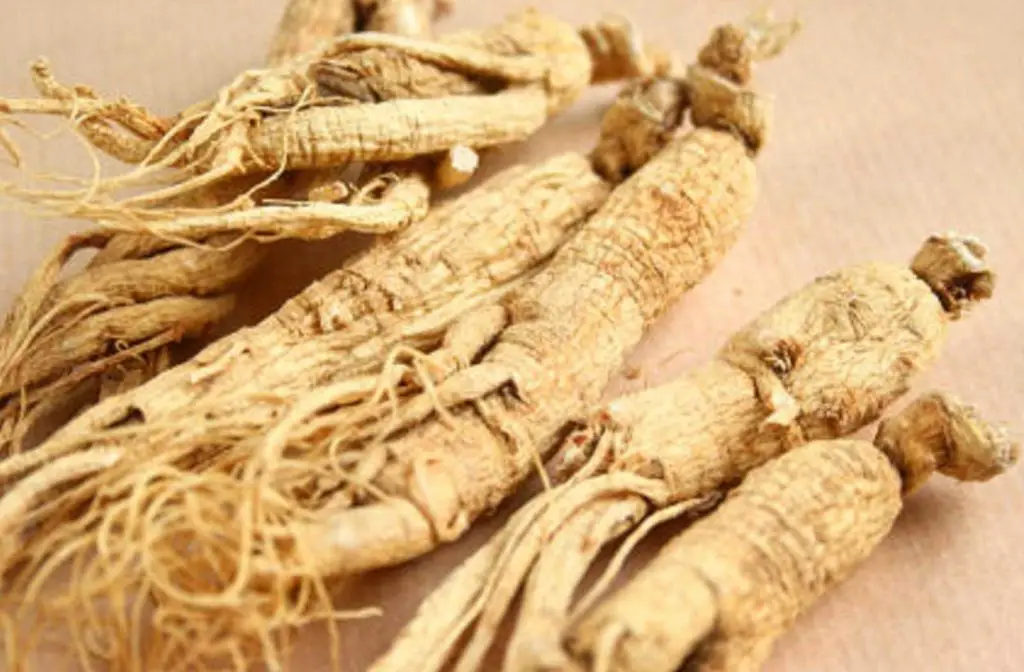What is Nerve Growth Factor (NGF)?
Nerve Growth Factor (often simplified to the initialism NGF) is a protein composed of group of molecules present in the brain for the purposes of cognitive functioning. It is one of the four proteins (among BDNF, NT-3 and NT-4) to comprise of neurotrophins.
Nerve Growth Factor is considered compulsory for the survival of both the sensory and sympathetic neurons in the brain. It contributes to the overall health of the brain by maintaining developed neurons while producing new ones. Nerve Growth Factor plays the pivotal role of promoting the survival, growth and maintenance of axons and neurons. This promotes a healthier passing of the electrical signal that passes through the nerves and repairs the coating around the axons known as the myelin sheath.
The amount of naturally occurring Nerve Growth Factor varies from person to person. A study conducted on 157 healthy adults showed that although age did not make a significant difference, sex played a role in the amount of NGF, showing that females had a significantly lower rate than males. The female participants showed an average rate of 112 picograms per milliliters in contrast to the two 243 picograms per milliliters in males.
Nerve Growth Factor was discovered by a developmental biologist and neurologist named Dr. Rita Levi-Montalcini. She received a Nobel Prize for her efforts in 1986. She claimed that, in order to increase her health and her lifespan, she used Nerve Growth Factor eyedrops.
Many diseases associated with Western cultures are related to low levels of Nerve Growth Factor such as obesity, metabolic syndrome, type 2 diabetes and atherosclerosis. However, higher levels of Nerve Growth factor are connected to increased numbers of histamine-producing mast cells and a variety of auto-immune diseases.
List of Herbs and Supplements for Nerve Growth Factor (NGF)
While Nerve Growth Factor is a naturally occurring substance in the human body, steps can be taken to increase amounts for the purposes of treating and preventing disease. Natural lifestyle choices shown in test studies have been shown to increase Nerve Growth Factor. Providing a social environment at a young age has shown to be effective in mice. Yoga or a daily cardio exercise routines of at least twenty minutes have been shown to have an effect as well. There are even sources citing “falling in love” or sexual activity to be factors. Time spent in the sauna or “heat shock” treatments are believed to be effective as well.
The following supplements have either been proven to support the growth of Nerve Growth Factor or have strong evidence indicating such a conclusion:
Lion’s Mane
The large, edible fungus known as Lion’s Mane has been proven to increase Nerve Growth Factor levels. Here’s our favorite Lion’s Mane.
PQQ
The antioxidant known as PQQ has been cited as a stimulant of Nerve Growth Factor, specifically in terms of regenerating peripheral nerves. Here’s a list of our favorite PQQ.
ALCAR
Studies on rats have shown increased levels of NGF and other neurotrophins. Here’s a list of our favorite ALCAR.
Rosemary
The carnosic acid present in rosemary and rosemary extract has been shown to induce the production of Nerve Growth Factor. Here’s a list of our favorite Rosemary.
Quercetin
A correlation has not only been drawn to the intake of quercetin and increased Nerve Growth Factor, but the regeneration of peripheral nerves as well. Quercetin is present in ginkgo biloba, adding to its many benefits. Here’s a list of our favorite Quercetin.
Zinc
In conjunction with adequate intake of Vitamin A and a diet/lifestyle promoting acidic pH levels, physicians and researchers believe that zinc may increase memory via the production of Nerve Growth Factor. Here’s a list of our favorite Zinc.
Lithium
It has been noted that despite some less-than-ideal side effects, lithium has shown increased Nerve Growth Factor in sexually mature rats. After a fourteen-day trial, test subjects showed improved NGF rates in the hippocampus, frontal cortex, amygdala and limbic forebrain. Here’s a list of our favorite Lithium.
Vitamin D3
Taken under the context of healthy blood sugar levels (effect is impaired if it is high), 24-hour treatments of vitamin D3 have proven to increase the brain’s concentration of Nerve Growth Factor. Here’s a list of our favorite Vitamin D3.
Melatonin
In a thirty day trial conducted on lab mice, direct injections of 1 mcg of melatonin to the submandibular gland resulted in an increased rate of Nerve Growth Factor. Here’s a list of our favorite Melatonin.
DHEA
It is believed that DHEA may contribute to the cortical neurons overproducing Nerve Growth Factor. However, further studies are needed to confirm this. Here’s a our favorite DHEA.
Astragalus
Physicians and researchers believe that there may be a link between the promotion of Nerve Growth Factor and the intake of an extract of Astragalus and are interested in developing studies to explore this possibility. Here’s a list of our favorite Astragalus.
Huperzine A
Anecdotal evidence and individual results have led physicians to believe that there is a correlation between increased Nerve Growth Factor and the intake of the herb derived alkaloid known as huperzine A. Many online accounts from individuals verify this. Here’s a list of our favorite Huperzine A.
Bupleurum
Studies have shown a correlation between increased amounts of Nerve Growth Factor in the bloodstream and the intake of bupleurum, which is derived from an herb known as radix bupleuri – an herb indigenous to China. Here’s a list of our favorite Bupleurum.
Ashitaba
Studies have shown a correlation between the daily intake of two teaspoons of ashitaba extract and an increase in production of Nerve Growth Factor by up to twenty percent. Here’s our favorite Ashitaba.
Yohimbine
Clinical trials conducted on rats showed increased norepinephrine in the blood stream of the test subjects. This resulted in the increase of Nerve Growth Factor. Here’s a list of our favorite Yohimbine.
Chrysin
As a result of pollination, the flavonoid chrysin found in a variety of plants and honey has been shown to increase levels of Nerve Growth Factor. Here’s a list of our favorite Chrysin.
Royal Jelly
The topical application of royal jelly has been proven to increase Nerve Growth Factor. Here’s a list of our favorite Royal Jelly.
Rehmannia
Clinical trials conducted on rats have shown that daily intake of rehmannia improves the cognitive functioning on test subjects. This includes the improved capacity to learn and an improved memory. Researchers believe that this is the result of the rehmannia stimulating increased Nerve Growth Factor production in the hippocampus. Here’s a list of our favorite Rehmannia.
Polygla Tenuifolia
Lab results have shown that the application of the root extract popular in Eastern medicine known as polygla tenuifolia increases secretions of Nerve Growth Factor. Here’s a list of our favorite Polygla Tenuifolia.
Nicotine
Believe it or not, the cultured neurons in the spinal cord have been shown to activate Nerve Growth Factor in response to nicotine. However, the noted addictive properties of nicotine cause physicians to caution against this method of increasing Nerve Growth Factor.
Best Foods for Nerve Growth Factor (NGF)
Specific food types, eating habits and regular exercise have been shown to be beneficial for cognitive development and the increase of Nerve Growth Factor. Limiting one’s diet to sources of proteins, essential fats, complex carbohydrates, vitamins and minerals, while minimizing the number of empty calories is an ideal method of increasing Nerve Growth Factor and strengthening the brain. A diet low in saturated and trans fats is best.
Habitual limitation of caloric intake prevents brain damage, while enabling it to more adequately repair itself. A diet rich in fruits containing flavonoids such as blueberries and grapes, leafy greens and vegetables, organic soybeans and Omega-3 fats improves cognitive performance in both children and especially adults. Honey collected from certain plants have been shown to increase NGF, as it contains chrysin.
Nerve Growth Factor (NGF) Benefits and Uses
Nootropic / Cognitive Function
The development of nerves and connections in the brain, as a result of increased Nerve Growth Factor, has been shown to result in higher cognitive functioning.
Treatment of Depression
Testing has shown that test subjects with higher levels of Nerve Growth Factor in their blood had a lower rate of Major Depressive Disorder than the control subjects.
Prevention of Multiple Sclerosis, Alzheimer’s and Parkinson’s
In tests that utilize models of the human brain, Nerve Growth factors were shown to lower inflammation, promote growth of myelin while repairing its damage and lessened the damage of brain tissue. These side effects have the benefit of preventing and slowing the damage of neurological diseases such as multiple sclerosis, Alzheimer’s disease and Parkinson’s disease. This has been confirmed by various studies. When a small test sample consisting of ten patients who had been diagnosed with Alzheimer’s disease were treated with a therapeutic transfer of NGF genes, their brain tissue showed growth, their axons sprouted neurons and they showed an overall improved cognitive function.
Heart Health
Clinical tests conducted on mice have shown that subjects treated with NGF were able to regenerate damaged nerves around the artery and blood vessels, eventually forming new blood vessels. It is believed that NGF treatments played a pivotal role in the healing process and that they can enable reparations to the heart after major damage or a heart attack.
Diabetes/Pancreatic Health
Physicians have drawn a link between levels of Nerve Growth Factor and the health of the pancreas. It has been found that NGF is a necessary component to ensure health of the beta cells within the pancreas. Those suffering from diabetes and similar diseases have shown to have low levels of NGF relative to control groups.
Cancer Prevention
Nerve Growth Factor has been shown to hold preventative properties in the spread of specific types of cancerous cells. Specifically, NGF in conjunction with regular intake of vitamin A, has been shown to diminish the growth of pituitary and hypothalamic tumors, as well as slow the growth of lung cancer of the small cell variety.
Fertility
Nerve Growth Factor is such an important contributor to the female reproductive system, that physicians and fertility experts have coined it as an “ovulation-inducing factor” (shortened to OIF). Within recent years, fertility experts have pinpointed NGF as a factor in the release of the egg from the ovaries of female mammals leading to its label as an OIF. They found that follicular fluid deficient of NGF in the ovaries, not only contribute to their inability to deliver egg cells, but are also linked to a higher likelihood of endometriosis. Nerve Growth Factor appears to play a role in male fertility, as well as female fertility as it is a well-represented component of semen.
Nerve Growth Factor (NGF) Side Effects
An overabundance of Nerve Growth Factor has been linked to some problematic side effects and ailments.
Increased Pain, Injury and Inflammation Symptoms: A recent experiment conducted using cells collected from human lungs showed that enduring inflammation resulted from an overabundance of Nerve Growth Factor. Patients who complain of chronic pain have been shown to have high levels of Nerve Growth Factor and inflammation is construed to be a byproduct of NGF’s response to injury inflicted on the brain.
Histamine Intolerance: A potential byproduct of the activation of mast cells in the presence of Nerve Growth Factor is the outing of histamines. As opposed to other neurotrophins, this is unique to NGF. Physicians say that this can ultimately contribute to a histamine intolerance.
Weakened Autoimmunity: Experts believe that Nerve Growth Factor has an effect on the functioning of the immune system, the hormonal system and the nervous system. A link between high levels of NGF and autoimmune deficiencies has been drawn and in many cases, inhibitors of Nerve Growth Factor have been prescribed.
Cancer: Research has shown that Nerve Growth Factor, along with other common neurotrophins, can stimulate reproduction of cancer cells and contribute to the survival of some types of cancerous cells. In some cases, Nerve Growth Factor has even promoted the production of new blood vessels in tumors.
Schizophrenia: In studies conducted on subjects suffering from schizophrenia, a correlation was drawn between the disorder and decreased blood levels associated with proteins like NGF.
What are NGF Eye Drops?
Although there are many supplements and natural life choices that can be utilized as a method of increasing the amount of Nerve Growth Factor in the body, eyedrops made as pure Nerve Growth Factor are a well-known source. This is because they work by passing through the individual’s optic nerve when applied. This makes the process much more efficient as the NGF is able to surpass the blockade known as the blood-brain barrier. This makes the process much more efficient. However, many online users balk at the price and lack of research on its effect on cognition. At a price of $310 dollars, a dose of 200 micrograms (a single dose of pure NGF) is an investment.
What is the NGF Gene?
The gene associated with the production of Nerve Growth Factor beta (also known as NGFβ) provides the necessary proteins to bind to the p75NTR receptor or the NTRK1 receptor. This process is important to the neurons’ survival and development, particularly for sensory neurons that process sensations of touch, temperature and transmit pain.
What is the NGF Receptor?
The Nerve Growth Factor receptor is also referred to as the p75 neurotrophin receptor or by the initialism, LNGFR (which stands for low-affinity nerve growth factor receptor). It serves as a receptor for Nerve Growth Factor, as well as other neurotrophins. This enables the neurotrophins to ensure the survival and differentiation of various cells present in neurons.
References:
https://www.ncbi.nlm.nih.gov/pmc/articles/PMC4955168/
https://www.jstage.jst.go.jp/article/bpb/31/9/31_9_1727/_pdf
https://ghr.nlm.nih.gov/gene/NGF
https://www.ncbi.nlm.nih.gov/gene/4803
https://www.ncbi.nlm.nih.gov/gene/4804
https://www.ncbi.nlm.nih.gov/pubmed/11520933
https://www.ncbi.nlm.nih.gov/pubmed/9631659





No Synaptolepis kirkii mentioned? Very quick and noticeable effects.
Hey Dano,
I’ve never seen Synaptolepis kirkii associated with Nerve Growth. Any chance you can send me the literature so I can research it?
Hi
What would be the best supplements to take for peripheral nerve regeneration? as I had a decompression of the ulnar nerve and now I am waiting for my nerve to recover.
Sadly 4 months on and nothing.
Hi George,
I’d suggest you talk with your GP or Naturopath but look into the supplements listed here. I even suggest one I feel is best.